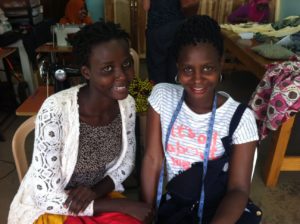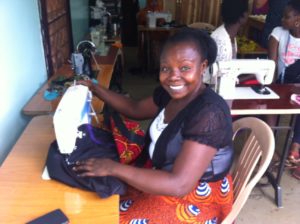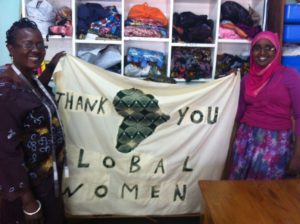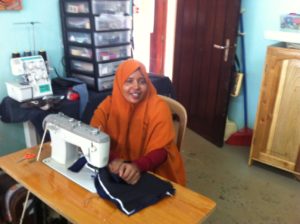It’s World Refugee Day! Today I want to honor the struggle, courage, and hard work of refugees around the world who have so much to offer.
- Refugees give back.I’ll be honest with you: Some of my students have never sat in a classroom prior to their seat at Refuge and Hope. Their nations have been in unrest for too long. If you’re trying to stay alive, you usually aren’t sitting in school.
Many of them are learning to read for the first time. They are adjusting to a new culture and so many new ways of doing things; at least one of our Western-style bathrooms has a printed poster: Please don’t stand on the seats. They’re all learning English, business skills like computers or sewing or baking, and health skills. They’re taking Bible. Check it out here:


And here’s what’s happening: In Kampala, 21% of refugees own a business that employs other people—and 40% of those employees are Ugandan nationals. I understand that welcoming refugees into a developing nation is unique. Yet check out this TED Talk and article on “4 Innovations that Could Turn Refugees from Burdens into Assets”:
[Director] Betts and his Oxford [Center for Refugee Studies] colleagues have been studying the economic lives of refugees in Uganda—not because Uganda is a typical host country, but because “it’s exceptional.” …Uganda gives refugees the right to work and freedom of movement. “The results are extraordinary, both for refugees and the host community,” he says.

Not only that, but God has used refugee crises the world over to bring people into a relationship with Himself. It the middle of all these displaced Middle Eastern refugees, I read stories like this—of Iranian refugees converting, and another I read where Iranian refugees seeking Jesus are actually reviving the Danish church. These are only a small representation of the beauty God is resurrecting worldwide as God not only blesses the refugees–but blesses through the refugees.

- I believe the need, and God’s words about refugees, are too great for me to turn a blind eye.According to the UN in 2014, every 4.1 seconds someone becomes a refugee or is internally displaced. Forty-one percent of refugees are under 18.
From personal experience, I understand exquisitely that taking in refugees is not always comfortable or safe. This crystallized for me while refugees from Rwanda stayed with my family. As her toddler ran around without a diaper, as the smell of the liver she was frying filled my kitchen, as we strategized on how to help her find a job, I mulled over the Good Samaritan. He could have justly been thinking of his safety, of the man taking advantage of him. I mulled over Isaiah 58:
Is not this the kind of fasting I have chosen:
to loose the chains of injustice…?
Is it not to share your food with the hungry
and to provide the poor wanderer with shelter—
when you see the naked, to clothe them,
and not to turn away from your own flesh and blood?
I realized God must have known exactly what He was asking when he asked us to do this.
The promises immediately following are also staggering:
Then your light will break forth like the dawn,
and your healing will quickly appear;
then your righteousness will go before you,
and the glory of the Lord will be your rear guard.
Then you will call, and the Lord will answer;
you will cry for help, and he will say: Here am I.
I think these promises not only because He would reward us, but He would also change us as we took these burdens as our own. His heart would mold ours.
Refugees change me.
It is true: I am indelibly different. It continues to push my family from we-give-all-our-old-clothes-to-Goodwill kind of generous, more toward His I-give-until-it-hurts-and-then-I-keep-going kind of generous.
Eighty percent of the world’s refugees are hosted by developing countries—the poor helping the poor. I marvel at this, even as Uganda continues to take in Somali refugees, despite two terrorist attacks from the Somali-based al-Shabab.
- We’ve got more in common than I thought. A friend recently reposted C. Sproul Jr.’s wise words: If the lesson you get from Jesus hanging w/sinners is you should hang more w/sinners you’re confused on who you are in the story. And I continue to return to David Platt’s words on adoption—that we adopt not because we are the rescuers, but because we are the rescued.
My home country, the United States, was in part founded by the Pilgrims—arguably, by refugees. Emma Lazarus’ poem emblazoned on the Statue of Liberty seems a startling allusion to the Gospel:
Give me your tired, your poor,
Your huddled masses yearning to breathe free,
The wretched refuse of your teeming shore.
Send these, the homeless, tempest-tost to me,
I lift my lamp beside the golden door!
Jesus took me when I was an alien—not just an alien; an enemy–and made me His daughter. He gave me liberty, skills, purpose, a future, a home. He gave me love. And really that—He—is why I welcome refugees.
“Um–I’m not even sure I know any refugees. So what can I do?”
I’ll echo some of the suggestions from A Sane Approach to the Refugee Crisis:
- Intentionally, strategically love on refugees.One friend of mine, out jogging in the U.S., felt a niggling to reach out to a pair of Muslim women she ran by every day, whose children also went to her daughter’s school. When she did stop and talk with them, she found that one’s eyes filled with tears; in light of the climate toward refugees, they were too afraid to walk alone. As the Church, we have a tremendous opportunity to care for these bereft families, particularly as those from otherwise closed countries come to us.
 Refugees sometimes need help with the most basic services in our communities, like medical appointments or navigating paperwork; others would love help with English, reading, or job skills. While we lived in the U.S., my husband and five-year-old distributed Christmas gifts to refugees. What refugee communities live in your area? (Perhaps your church is already connected!)
Refugees sometimes need help with the most basic services in our communities, like medical appointments or navigating paperwork; others would love help with English, reading, or job skills. While we lived in the U.S., my husband and five-year-old distributed Christmas gifts to refugees. What refugee communities live in your area? (Perhaps your church is already connected!)
- Donate to vetted organizationswho provide for refugees’ tangible needs–particularly career training, etc. (I’m partial to Refuge and Hope!) World Relief is one of the few organizations that have permission to help with resettling Syrian refugees in the U.S.; World Vision is also fundraising for them. Personally, I have friends expanding their ministry of trauma counseling to the Middle East for the Syrian refugees; you can help their organization,
- Pray for them.Perhaps this seems like a no-brainer–but even as I sit and type this, I realize how little I’ve prayed about the current crisis. Pray that
- the Church will richly, sacrificially extend God’s love and protection
- refugees will be led to Christ
- for refugees’ protection and the protection and wisdom of host countries
- that God will show your family personally how to respond.
I count over seventy references made by the Bible to foreigners and refugees;here are some of the broadest themes about how we should treat refugees. I keep thinking that if God identifies Himself as the God of the orphan, the widow, and the alien, I want us, too, to be famous for this. Wanna help?












![Now You're Speaking My [Love] Language Now You're Speaking My [Love] Language](https://www.janelbreitenstein.com/wp-content/uploads/2015/08/love-languages-text-1.jpg)





Leave a Reply